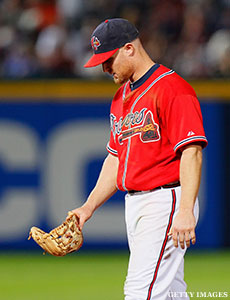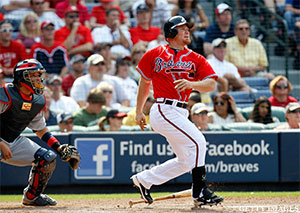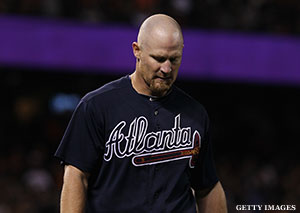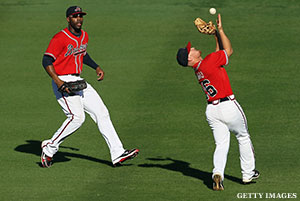
The way Brooks Conrad remembers it, and honestly it was all moving a little fast at the time, the vaguely familiar earrings were in his wife’s hand, which was shaking from anger and fear and whatever else courses through a wife’s nervous system when she's discovered another woman's earrings in her husband's travel bag.
Jessie, his darling Jessie, who'd tried so hard not to cry that afternoon when he'd lost his bearings and the baseball kept bouncing away and 53,000 people were booing and calling him a hack, her lip was quivering again and her eyes had narrowed and geez what a day this was turning into.
Maybe five minutes before, everybody in the house -- Jessie, his parents, her parents, even the kids -- were mostly tending to Brooks, which entailed some keep-yer-head-ups and a conscious effort to ignore the television and one earnest search for conversation topics that did not include baseball.
It's amazing, Brooks thought, what a seemingly innocent hunt for toothpaste might turn up.
"Whose are these?" Jessie demanded.
"They're not yours?" Brooks tried.
"I wouldn't wear these," she accused.
"Jessie," he pleaded.
They'd met a decade before at Arizona State, where he was a physical education major and second baseman and she was a nursing major and member of the track team. They'd become friendly, started dating and three months later -– at the end of his junior year -– he was drafted by the Houston Astros. Before he went off to Pittsfield, Mass., and the start of his professional career, Brooks proposed they continue seeing each other, in spite of the distance.
"We're staying together," he told her.
"OK," she said, "that sounds good."
So, they hung in there through his tours of minor-league towns, beginning with the three years of A-ball, and they married in 2004. Jaxon, their son, was born almost four years later, after a year-and-a-half in Double-A and two years in Triple-A. Reese, a daughter, came along after another two years in Triple-A and 19 big-league at-bats, those with the Oakland A’s.
Jessie understood Brooks, and began to learn the game, and rode along with his baseball aspirations. When he was making $850 a month playing ball, she was working as a travel nurse, keeping them afloat. She was raising the children. She'd even talked him into paying off his truck, a gray Chevy pickup with huge tires he'd financed with money from his signing bonus and still carried a monthly nut of $750.
"Without her ... " Brooks would often say, feeling very lucky about that.

She'd rushed off to Tampa to see his major league debut in late July 2008 and was waiting outside the clubhouse in Boston when, 10 days later, he was sent back to the minors, where he'd spend another 11 months chipping away at the dream.
And damn, wouldn't you know, it was working out. He'd signed with the Atlanta Braves after the 2008 season, played 30 games in the majors in 2009 and, as a 30-year-old rookie, made their opening day roster in 2010.
Just like on those Little League fields in North County San Diego, and at Monte Vista High School in Spring Valley, and at ASU and then wherever the bus dropped him after that, Brooks had kept on coming, kept pushing, washed his uniform and showed up and discovered new ways to make something of the game and himself.
The dream wouldn't have been as good, as real, if it hadn't been Jessie’s too. That, he knew.
She'd asked him one day, "Do you really think you can be in the big leagues? Do you have a chance?"
"I do," he said.
"OK then," she said. "You think so, so you can."
The earrings hit the bottom of the trashcan with a tinny clunk.
Brooks watched, helpless. He'd seen the earrings in his travel bag weeks before and figured they were Jessie's. His mind, which had run hard all day, searched. Maybe a maid had dropped them in there when he was in Miami or New York or Philadelphia. Maybe they belonged to a teammate's wife, and were carelessly tossed into his bag by a clubbie. Maybe, well, maybe what, he wondered. Jessie'd never buy it now.
Three hours before he'd lost a playoff game almost by himself. He'd made three errors at second base -- missing a grounder in the first inning, dropping a popup in the second and whiffing another grounder in the ninth. The San Francisco Giants, not much of an offensive team, had turned them into the better part of three runs and won, 3-2. The Braves would face elimination the following day.
This can't be happening, Brooks begged, but the ball kept finding him, and his body wouldn’t cooperate with his head, or his instincts. In the stands at Turner Field, his parents –- Jerry and Gail, wearing for the first time their new white Braves jerseys, CONRAD proudly across the shoulders -– gripped their arm rests. Jessie had taken Jax to the bathroom in the ninth inning when she heard the crowd groan, then the boos. "Please," she thought, "don’t let that be ... "
She wanted to go home, to disappear from that place where everyone was so mad at her Brooks. She didn't want them to see her cry, to embarrass Brooks. But she couldn't just leave him there, so she took a breath and drew back her shoulders and snuck up on the family room, where Billy Wagner greeted her with a long hug and David Ross did, too, along with some kind words. She and Brooks drove home, opened the front door, and she went straight to the bathroom and cried there.
Now they stood a few feet apart and Jessie was wondering if that's where all the errors had come from, Brooks being distraught over cheating on her, crazy thoughts about what this meant for her, for them, the kids. Geez, she thought, what a day this was turning into.
"I don’t have an explanation," he said. "It's not what you think."
"I believe you," she said, with not enough conviction for Brooks.
"You shouldn't believe me," he said. "I mean, you shouldn't have to."
"We don't need to worry about this right now," she said. "You have other things ... "
"No," he said. "This is the most important thing. Who cares about baseball?"

He'd come home seeking perspective. The game was the game. The rest was his life, the best part. Right?
Brooks Conrad was raised on a hill outside San Diego in a house with hummingbird feeders, wind chimes and a sign -– Casa Hakuna Matata -– out front, along with an American flag and a basket of pink and white flowers.
The backyard falls toward a grassy gully, flattening just long enough for a fir tree, two Adirondack chairs and a chiminea. The grade resumes past a chain link fence, falling away toward pepper trees and horse trails.
Before it was prettied up for the adults in the house, before it became a place for early evening breezes and light conversation, the plateau on the far edge of the property held a more rigorous purpose.
See, the Conrads weren't as interested in raising a lawn as they were children, so this is where the soccer nets went, along with the bike jumps, the go-cart track, the hay bales for the bow-and-arrow set unwrapped at Christmas and, of course, the batting cage.
Jerry Conrad had played baseball and basketball, but in his soul was a football player, which he was in high school and college. Gail, his wife, had been a pretty fair third baseman. As parents, they believed in the values of an open front gate, a patch of dirt, a ball and make-them-up-as-you-go rules. They had a daughter, Jessica. Three years later they’d had a son whom they named after the third baseman for the Baltimore Orioles, yet had no more inclination to turn Brooks into a ballplayer than they did, say, an engineer or a mathematician or a teacher.
Brooks chose baseball. Small and fast and strong, he attacked the game. Other parents noted he carried himself on a ball field like a little man, with such confidence and poise. Jerry, a carpenter at Southwestern College, brought home discarded netting and pieces of gates and fencing, and built a batting cage. He put aside some money, bought a double-wheel pitching machine and taught Brooks to switch-hit.
Years later, Jerry sat in the field-level seats at Petco Park, a 15-minute drive from where the old batting cage had stood. Brooks was on the field taking batting practice with Chipper Jones and Jason Heyward and Brian McCann. He'd become a big leaguer, if not a star. He'd come to represent something very cool about the game, an example for the other grinders and believers out there, what it looks like when a man won't be talked out of who he is and what he does.
"I didn’t try and beat that into him," Jerry says now. "It was something that was there. You could see it, so you let it happen.
"I'd been around athletics enough to know -- and we told Brooks, it was our mantra – there's always somebody better than you around the corner, down the street, in the next town. No matter where you go, there's going to be guys as good as you or better."
That didn't bother Brooks, not when he was the smallest guy on the field, not when he was moved from shortstop to second base in college, and not when seven years came and went in the minor leagues, when Septembers passed without call-ups or explanations. He kept playing, kept dreaming, even as his 30th birthday approached and so many friends and teammates had given up and gone home. He told Jessie he'd rather be the 25th man -– the last man -– on a big-league roster than a star anywhere else, if that's what it took. His mom had challenged him as a boy to never return to her without a dirty uniform, and he laughed when Jones began calling him "Dirt Dog," as he'd be filthy by the end of batting practice.
He is a product of his home, of a father and mother who sacrificed for him, because that's what parents do. And of grandparents who lived in the back of the house, in an addition Jerry built for them, and of Mimi's cupcakes and Papa's poached eggs and bacon. And of a family that would pile into Aunt Linda's motor home and drive many weekends to Arizona State, just to watch Brooks play a couple baseball games.
From them, Brooks could hardly wait to start his own family, to become the father his own was.
"He was always there," Brooks says.

For the hug on draft day, when Brooks went in the eighth round to the Astros. For the phone call from Sacramento more than seven years later, when Brooks had been summoned to the big leagues. For the laughs last May, when Brooks hit a walk-off pinch grand slam against the Cincinnati Reds, an experience that included him wearing the wrong batting helmet -– the earflap was facing the catcher –- to the plate, pausing near first base when he believed the ball had been caught, and then nearly doming himself when he misjudged his celebratory helmet toss.
And then for the October day in 2010, when nothing went right.
"It's part of the game," Jerry told Brooks. "And you gotta accept that. It's life, too. You can’t just isolate yourself and pretend things aren't going to happen. When they do, you gotta face up to it."
Brooks nodded, and Jerry fought the urge to take him out back for a hundred ground balls, like they'd always done before.
"Sorry, I'm going to get emotional here," Jerry says in the seats at Petco. "Baseball is a great game. It's a lot like life in so many ways. It teaches you a lot of great lessons. And that's why I think he's so lucky to play it. But I'm prouder of who he is. He's a loving father, husband. He's great to his family, all of us. He's very conscientious, truthful, honest.
"You know, sometimes being like that, it's hard to be in a business like this. It gets pretty brutal. You have to be strong-willed, sometimes egotistical. Maybe, I don't know, selfish? And Brooks isn't like that normally. But he still cares a tremendous amount. He's a good man. His mom and I, we're very lucky."
Brooks, turns out, is pretty lucky, too.
Today the Dirt Dog is the second pinch-hitter -– behind Eric Hinske -– for Braves manager Fredi Gonzalez, and has played about a dozen games at second and third base. He's fourth in the National League with 32 pinch-hit at-bats, third with seven pinch RBIs and first with three pinch home runs (and first with 15 pinch strikeouts). If that's his job, then that's his job, and he'll love every second of it. Only three weeks ago, Jerry asked him if he could be happy at the end of the bench, and Brooks told him, “Dad, I am having so much fun. I'm excited every day. I love it.”
And as for Jessie? After a horrible night in which she barely slept, she arose with the previous evening still on her mind. Brooks, who hadn't slept either, listened to her leave the room.
Jessie returned to the trashcan, then found her mother-in-law, Gail, in the kitchen. She opened her hand.
Gail grinned.
"Oh, gosh," she said. "Where'd you find my earrings?"




